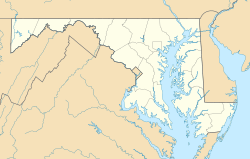Hooper Island Light facts for kids
|
|
|
| Location | 4 mi west of Middle Hooper Island in the Chesapeake Bay |
|---|---|
| Coordinates | 38°15′22.5″N 76°14′59.3″W / 38.256250°N 76.249806°W |
| Year first constructed | 1902 |
| Year first lit | 1902 |
| Automated | 1961 |
| Foundation | Pneumatic caisson |
| Construction | iron |
| Tower shape | round "sparkplug" tower |
| Markings / pattern | White on brown base |
| Focal height | 63 feet (19 m) |
| Original lens | fourth-order Fresnel lens |
| Current lens | solar-powered |
| Range | 9 nautical miles (17 km; 10 mi) |
| Characteristic | Flashing White, 6 seconds |
| Fog signal | Horn, 1 every 30 seconds Operated continuously from Sept. 15 to June 1 |
| Admiralty number | J2080 |
| ARLHS number | USA-377 |
| USCG number | 2-7590 |
The Hooper Island Light is a lighthouse found in the Chesapeake Bay. It stands west of Middle Hooper Island in Maryland. Lighthouses like this one help ships find their way safely.
Contents
History of Hooper Island Light
Building the Lighthouse
People first asked for a light at this spot in 1897. But building the lighthouse was delayed until 1901. This happened because a company called Variety Iron Works couldn't deliver the materials on time.
The foundation of this lighthouse was built using a special method. It was called the "pneumatic process." This is different from how earlier lighthouses in the bay were built. In this method, a large, watertight box called a caisson is used. Air pressure inside the caisson keeps water out. Workers can then dig inside the caisson. This helps the large cylinder sink down to the right depth.
Unique Design and Features
The Hooper Island Light is taller than other "sparkplug lights" in Maryland. Sparkplug lighthouses are tall, narrow towers that look a bit like a spark plug. This lighthouse has a special room for the watchkeepers. It also has a lantern room at the very top. This design is the only one of its kind in Maryland.
At first, a fog bell was placed on a lower platform. Later, it was moved up to the watch room level. In the 1930s, a fog horn was added as a backup. The light's pattern of flashes changed several times over the years.
Modern Changes and Protection
Like many other lighthouses in the Chesapeake Bay, the Hooper Island Light became automated in the early 1960s. This means it no longer needed people living there to operate it. In 1976, the original Fresnel lens was stolen. A Fresnel lens is a special type of lens that helps make the light beam very strong and visible far away. After it was stolen, a new solar-powered lamp was put in its place.
The Hooper Island Light Station was added to the National Register of Historic Places on December 2, 2002. This means it's recognized as an important historical site. In June 2009, the lighthouse was officially given to the U.S. Lighthouse Society. Even though it's now managed by this group, the light still works and guides ships today.
- Hooper Island Light Station, Dorchester County, including photo from 1991, at Maryland Historical Trust
 | Selma Burke |
 | Pauline Powell Burns |
 | Frederick J. Brown |
 | Robert Blackburn |



